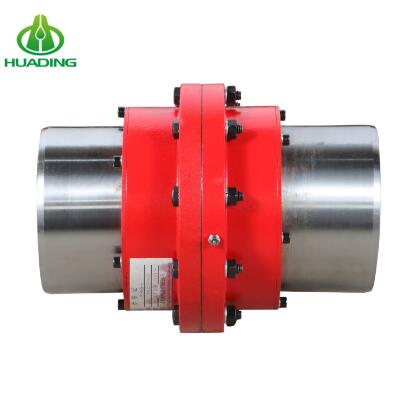Achieving reliability in gear couplings is crucial to ensure the smooth and efficient operation of industrial machinery. Gear couplings are used to connect two shafts, transmitting torque while accommodating misalignment and providing flexibility. To enhance gear coupling reliability, consider the following key practices:
Proper Installation:
Alignment: Ensure that the shafts being coupled are properly aligned. Misalignment can cause premature wear and failure of gear couplings. Use precision alignment tools to achieve the required shaft alignment, both angular and parallel.
Torque Specifications: Follow the manufacturer's recommended torque specifications for tightening bolts and fasteners. Over-tightening or under-tightening can lead to issues, so use a calibrated torque wrench for accuracy.
Lubrication: Apply the appropriate lubricant as recommended by the manufacturer. Adequate lubrication is essential to reduce friction, wear, and heat generation within the coupling.
Regular Maintenance:
Inspection: Implement a routine inspection schedule to check for signs of wear, misalignment, or damage. Visual inspections can often catch issues before they lead to coupling failure.
Lubrication Maintenance: Ensure that the lubrication system is functioning correctly. Lubricant levels should be monitored and maintained within the recommended range.
Bolt Tightness: Periodically check the tightness of coupling bolts. Vibrations and thermal cycling can cause bolts to loosen over time.

Wear Monitoring: Keep an eye on wear patterns and contact surfaces. Any irregularities or signs of excessive wear should be addressed promptly.
Alignment Checks:
Regular Realignment: Even with proper initial alignment, machinery can shift over time due to various factors, including temperature changes and machine settling. Regularly check and, if necessary, realign the shafts to maintain correct alignment.
Alignment Tools: Utilize laser alignment tools or other precision equipment for accurate alignment. These tools provide real-time feedback and improve the accuracy of the alignment process.
Balancing:
Dynamic Balancing: In applications with high-speed rotating machinery, ensure that components are dynamically balanced to reduce vibrations. Unbalanced loads can lead to premature wear in Huading gear couplings.
Temperature Management:
Cooling Systems: In high-temperature environments, consider the use of cooling systems to maintain appropriate operating temperatures. Excessive heat can accelerate wear and reduce coupling life.
Load Considerations:
Overloading: Avoid overloading the coupling beyond its specified torque capacity. Overloading can cause damage and lead to failure.
Torque Limiters: In applications with potential torque spikes or overloads, consider incorporating torque limiters or overload protection devices to prevent damage to the coupling.
Environmental Protection:
Sealing: Ensure that gear couplings are adequately sealed against environmental contaminants, such as dust, dirt, and moisture. Sealing helps protect internal components and prolongs coupling life.
Training and Expertise:
Operator Training: Train personnel in proper maintenance and operation procedures. Knowledgeable operators can detect issues early and take appropriate actions to prevent failures.
Monitoring Systems:
Condition Monitoring: Consider implementing condition monitoring systems that can detect changes in vibration, temperature, or other parameters indicative of coupling wear or impending failure. These systems can provide early warnings, allowing for timely maintenance.
By following these practices, you can significantly enhance the reliability and longevity of gear couplings in your industrial machinery. Regular maintenance, correct alignment, and load management are critical factors in ensuring the smooth and trouble-free operation of gear couplings.



Comments
All Comments (0)